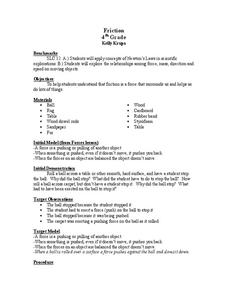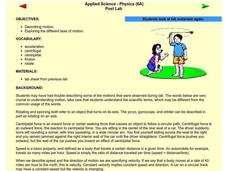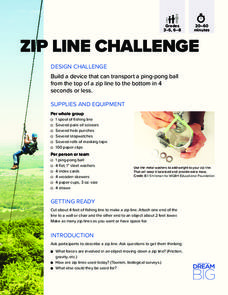Teach Engineering
May the Force Be With You: Drag
Do not let friction drag you down! The 11th segment in a series of 22 focuses on the fourth force acting upon an airplane—drag. Pupils learn about the effects and causes of drag.
Broward County Public Schools
Force and Motion
Get the ball rolling with this upper-elementary science unit on forces and motion. Offering over three weeks of physical science lessons, this resource is a great way to engage the class in learning about simple machines, friction,...
DiscoverE
Friction in Action
There's no need to have friction among instructors regarding the resource. Pupils investigate how marbles and coins slide along different surfaces which gives them information to estimate coefficients of friction.
Curated OER
May the Force Be With You
Students work in groups, they investigate how different forces act upon objects and how this information can be used in their day-to-day lives. They wrap the rubber band around the book. Students place the bo.ok and ruler on top of a...
Curated OER
Forces and Motion
Young scholars are able to analyze gravity as an universal force. They are able to demonstrate ways that simple machines can change force. Students are able to determine how the force of friction retards motion. They are able to...
Curated OER
What a Drag
Learners learn examples of friction and drag, and suggest ways to reduce the impact of these forces. The equation that governs common frictional forces is introduced, and during a hands-on activity, students experimentally measure a...
Curated OER
Friction
Fourth graders investigate friction as a force that is present around us. They observe as a ball is rolled on different surfaces and stopped before discussing what happens. Using different surfaces, they make predictions as to what type...
Curated OER
Laws of Motion
Students explore centrifugal and centripetal force. In this motion lesson, students expand on their knowledge of motion to study velocity, acceleration, and friction. Students examine multiple objects to demonstrate the laws of motion.
Curated OER
Hovercraft
Students assess human impact on water quality. They determine how the force of friction retards motion. Pupils describe and measure quantities that characterize moving objects and their interactions within a system: Time, Distance,...
Curated OER
Forces and Balloons
Students investigate the forces of compression, tension and torque on common birthday balloons.
Institute of Electrical and Electronics Engineers
Give Me a Brake
Learners explore the concept of how brakes can stop or slow mechanical motion. They examine the operation of a bicycle brake and use low cost materials to devise a simple braking system. Finally, they work as a team to suggest...
Curated OER
Roller Coasters
Twisting and turning through the sky, roller coasters are popular attractions at amusement parks around the world, but how exactly do they work? Explore the physics behind these thrilling rides with an engineering design activity....
Curated OER
Freestanding Structures: A Tech Museum Floor Activity
Students attempt to design the tallest structure that they can with the given materials which are wooden dowels and rubber bands. They discuss the physics of their structure and how they would improve it the next time they built a...
Curated OER
MagLev Train System Activity
Students are able to analyze practices that affect the use, availabiltiy, and management of natural resources. They are able to show that the forces of friction retards motion. Students investigate electricity and magnetism as...
Curated OER
Wheelies
Students design wheels for a coaster car to travel varying terrain. In this motion and friction lesson plan, students discuss friction and motion and test wooden wheels on a track. Students then brainstorm how to increase friction and...
Colorado Unit Writing Project
Simple Machines
Planning an elementary science unit has never been simpler! These twelve lessons guide young scientists through an exploration of simple machines and their many uses in the real world before asking them to apply their learning...
Curated OER
Science: Avalanche!
Eighth graders examine avalanches after reading excerpts from John Muir's book, "The Yosemite." In small groups, they conduct experiments with flour, sugar, and potato flakes representing different snow consistencies. Then, 8th graders...
Curated OER
Investigating Motion
Students explore types of motion. In this motion experiment, students observe how objects move. Students work in small groups to discover the laws of motion.
DiscoverE
Zip Line Challenge
Harness the awesome power of gravity. Scholars build a zip line to transport a ping-pong ball. The challenge is to get to the finish line in under four seconds. At that speed, individuals better be sure to strap on the harness!
Kenan Fellows
Analyzing Speed from Different Modalities
Show us your moves. Using sensor equipment, scholars track the motion of different movements, such as jogging, skipping, or jump roping. They analyze velocity and acceleration and create graphs representing each movement.
DiscoverE
Build a Bobsled Racer
Host a design challenge of Olympic proportion! Junior engineers build their own bobsleds using simple materials. The activity focuses on kinetic and potential energy and how the center of mass affects motion on a downhill track....
Purdue University
Exploring Whirligigs
What's that silly thing spinning in the wind? It's a whirligig! Explore wonderful windy whirligigs with a STEM-based unit that teaches the science and concepts behind these gigs. Scholars discover how gravity and air resistance...
Purdue University
Designing Safer Roadways
Be careful on curvy roads. An interesting STEM activity challenges scholars to design a safe road system. The goal is to help ensure that cars coming down a hill will be able to make a right turn without sliding off the road. Pupils test...
BBC
Light and Shadows
Light is such an amazing thing! Elementary schoolers explore the wonderful world of light and shadow. The lesson is meant to be carried out on a whiteboard. Objects are placed in front of a light source, and learners must predict what...























